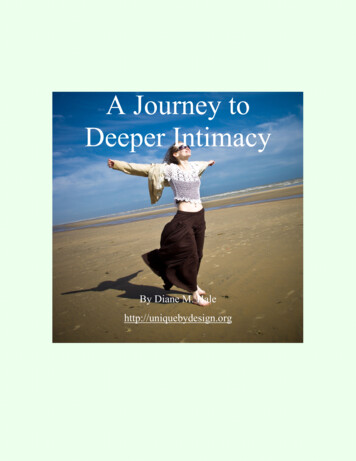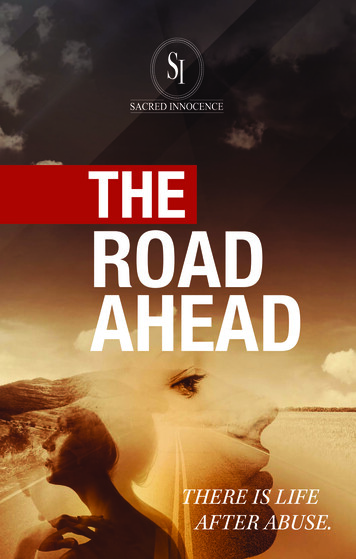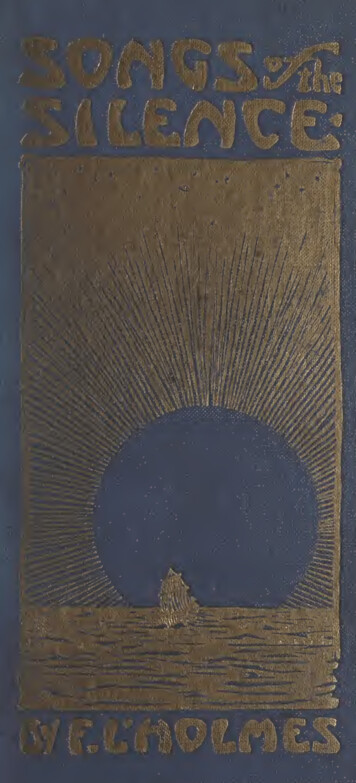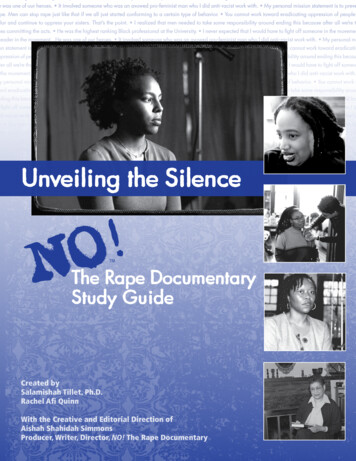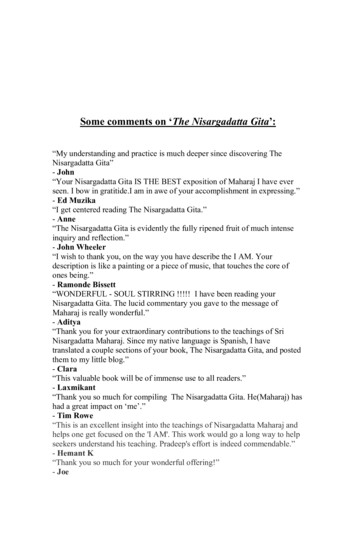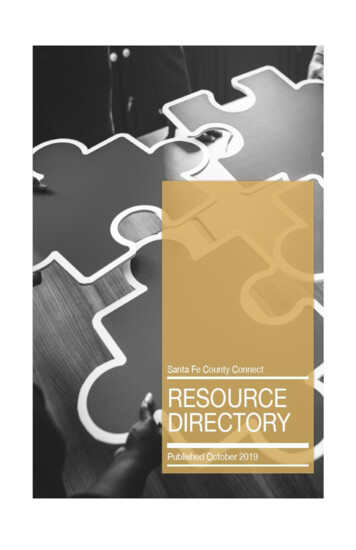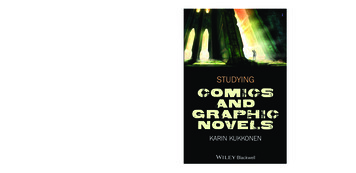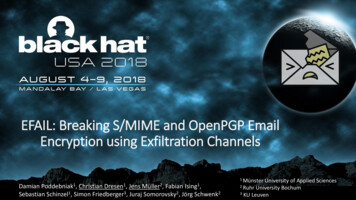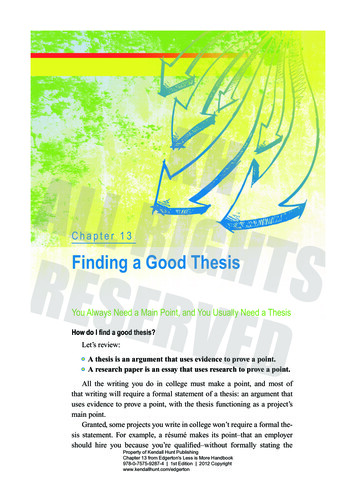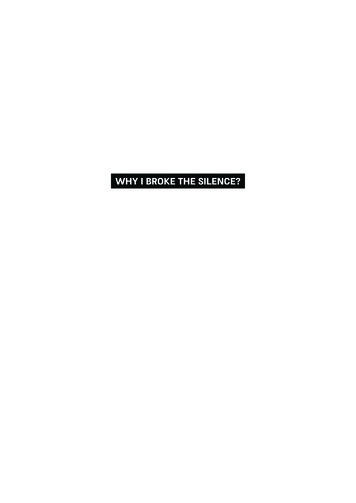
Transcription
23On Breaking SilenceBreaking the silence is a process. It calls on us to carefully peel off, one by one, the thick layers of denialand repression that we draped over ourselves, demanding painful recognition of the sad truth of theoccupation, and the role we played in its execution. The exact moment that triggered this process isdifferent for each and every one of us: for some of us the decision to break the silence arose in a momentof clarity, and for others it was a longer process of digesting conflicting emotions. For some it was the senseof civic duty, and for others, an eroding sense of unease.Yet for all of us, breaking the silence was the result of a direct and painful encounter with the occupation.It is the result of realizing that we cannot remain silent in the face of the blatant injustice we saw throughthe windows of the military jeep, or ignore the plight of those whose homes we forcefully raided in themiddle of the night. The act of breaking the silence is our resolution to rise up against injustice, againstthe repression of freedom, and against the callous hardening of the heart, ever-present in the occupationitself, and in all of us who served it.The act of breaking the silence is the readiness to carry the burden of responsibility for what we, as soldiersand commanders, did in the occupied territories: for the countless invasions into innocent people’s homes,for the pointless checkpoints in the heart of Palestinian villages, for the wreckage we sowed by a slightpull of the trigger, and for that one slap on a man’s face that will forever shadow his dignity. For all of that,and more, we take full responsibility.Yet, in doing so, we demand that Israeli society take responsibility for what it sends us to do. The very societythat embraces us as the nation’s ‘children,’ but sends us at age 18 to be foreign rulers over others, withoutstopping to think what service in the occupied territories actually entails. We demand our society, Israelisociety, to listen to our story – as it is their story, too. We expect them to take responsibility and put an endto the occupation.Breaking the Silence’s activities are made possible through the generous support ofindividuals and foundations including:Broederlijk Delen, CCFD, Dan Church Aid, Die Schwelle, the Delegation of the EuropeanUnion to the State of Israel, Foundation for Middle East Peace, Human Rights andInternational Humanitarian Law Secretariat, medico international, MISEREOR, TheMoriah Fund, New Israel Fund, Open Society Foundations, Rockefeller Brothers Fund,Sigrid Rausing Trust, SIVMO, Swiss Federal Department of Foreign Affairs, Trócaireand the countless private individuals who have made contributions to our work overthe past year.This list represents a list of donors correct to the date of publication. The contentsand opinions of this publication do not represent those of our donors or partners andare the sole responsibility of Breaking the Silence.All of the photographs in the booklet were taken by soldiers throughout their militaryservice in the West Bank. The pictures do not necessarily correspond to the eventsdescribed in the booklet.Breaking the silence confronts us with who we are and what we have become in the aftermath of sippingfrom the goblet of power and control. The reflection that surfaces often contradicts the image we had ofourselves. When these contradictions are revealed, cracks begin to appear, and these cracks are dangerousas they challenge the blind faith we have in the righteousness of our path. The blind faith that allows manyto look away and find excuses for the injustices we have been inflicting on others for the past 50 years andcounting. The blind faith that allows us to say that what is wrong is sometimes right, and that for the sakeof our so-called 'own good' we are permitted to do evil to others.We broke the silence because we believe it is our moral duty to speak about the injustices we saw andinflicted. Breaking the silence has compelled us to pose questions about things Israeli society taught usthere are no questions to ask. Questions about the IDF being the 'most moral army in the world,' about Israelas a peace loving nation simply protecting itself from the enemy, or about how these disagreements mustbe resolved solely 'in the family.' When all these question marks appeared we found ourselves standingbefore a huge abyss, undermining the blind faith that shaped our identity as Israelis and soldiers. And yetwe still believe it is our duty to break the silence.However, the act of breaking silence will not be complete without others breaking their silence – others whowere, and still are, part of the prolonged and ever-deepening occupation. Our mission will not be completeuntil a critical mass of Israeli society will break the silence – a society that in its name and for its sake wehave continuously occupied the lands and souls of our neighbors. We broke the silence as we believedthat no change were to be possible without acknowledging the responsibility we have toward the reality ofthe occupation – a reality that deeply disrupts the lives of millions of people under our rule. Without suchchange, Israel will never become the beacon of truth and justice that we strive for it to be.
451First Sergeant Haruv Battalion 2012We issued an activity on Route ****, which is a routethat crosses Ramallah from below. We were told, "Sinceit's a night route, not supervised much, many terroristspass through there." We commenced the activity andbegan to stop vehicles. The first vehicle we stoppedhad two Palestinians transporting goods, and theirHebrew was good. Their Hebrew seemed too good tome, and they seemed to know too well how to conductthemselves with soldiers, so we checked their vehicle,we asked them to take things out. The next vehiclearrived, a couple on their way to a wedding. We tookthem out of the car, of course. Every time I talk tosomeone, my signaler has his weapon pointed at him,at his face. I'm talking to the person and I don't knowif he has a knife on him, if he has a million things thatcould endanger us. He [the signaler) had a bullet inthe barrel. The weapon is cocked. You enter Area Awith cocked weapons. And then a family arrives. AndI'll never forget that family until my dying day. Thefather and mother got out of the car, and my soldierhad his weapon aimed at the father, and they're ontheir way home from a wedding, and three littlegirls get out of the car with him. As I'm talking to thefather, his little girl is clinging to his leg. I'm standingthere, next to me a soldier is pointing his weapon ather father, and the little girl is clinging to his leg. Wecheck the car. My soldier says to me, "Can I turn theweapon away?" I answer, "No, you can't," because ofmy understanding that we have to conduct this wholething professionally, to defend ourselves.Why did you carry out this mission?Because they said that we need to have anotherinitiated mission tonight. They said, "You have to goto that route there to set up a checkpoint." You'reblocking a route that doesn't have a checkpoint. You'redoing a flying checkpoint. Mostly they said that thereare many terrorists there, they drive and that's howthey smuggle weapons.Why I Broke The Silence? ״ For years now I ׳ m still thinking aboutit. Did I behave properly during thatincident? Should I have opened fire?Did I not need to? Was I right toshout ׳ be quiet ׳ at some Arab, or was itunnecessary, but definitely that it ׳ snot what you ׳ re supposed to do in thearmy. And that ׳ s the feeling, a hundredpercent, that it ׳ s simply not your job ״ What do you feel upon your release?Was it a family returning from a wedding?A family returning from a wedding. Dressed nicely. Hewas even in a suit, very fancy. And he's standing thereat the junction, at 11 PM, with a 20-year-old soldiertalking to him, and a 19-year-old soldier pointing aweapon at his face in front of his little girl and hiswife, who’s standing by the car with a soldier watchingher, and that's normative. And then you say – it’snormative in his eyes as well. He somehow acceptsit, he's treating me in a dignified manner and hesimply wants to move on because this is his life. Andthat's also something you notice at checkpoints: theyoung kids and Palestinian youth, you can still see thehatred in their eyes. You see it immediately at mostcheckpoints. But the older people, you see that they'realready occupied people. They're people with a twinklein their eye that doesn't exist, and they plead with youbecause they know there's no other way. The youngpeople don't plead. The old people plead. "Please,soldier, I want to pass through, I need to work," becausethey've already gone through so much occupation thatthey don't have any more strength to resist. Becausewhoever resisted in their generation is probably nolonger around.A bit of shame. That's a lie, there's also pride. I'm veryproud of myself that I was a combatant, so I finishedmy service feeling strengthened. But there’s a lotof shame, many thoughts afterwards, and for yearsnow I'm still thinking about it. Did I behave properlyduring that incident? Should I have opened fire? Did Inot need to? Was I right to shout 'uskut' (be quiet) atsome Arab, or was it unnecessary, but definitely thatit's not what you're supposed to do in the army. Andthat's the feeling, a hundred percent, that it's simplynot your job. I was a policeman, but a policeman foronly one side, and I don't know. A lot of hatred for thesystem. A feeling of being exploited and That they tookeverything out of you in impossible conditions, and thenit sort of doesn't interest anybody. I thought that I wouldbe a combatant and defend the country, and sometimesyou do actually have the feeling that you're defending[the country] from terror, but then when you thinkabout it you realize it isn't exactly [like that].So why do you actually think that it's important tobreak the silence?Because people have got to know what's going onthere. And because people don't know. A hundredpercent of the people I talk to, who haven't servedthere, don't understand – "Oh, the checkpoint isn'tbetween the [West] Bank and here?" I don't know, I feelthat the only way for a society to reach catharsis, to gothrough a process with itself and accept what it didin order to move on, to enable some sort of process ofopening and renewal, it must know what's going onthere. If we send our children there, then we shouldn'tbe surprised that some of them don’t take it well, dowrong things, and behave in a manner we wouldn'twant [anyone] to behave toward us. And it's a problemthat an entire society programs you, indoctrinates you,at some point in the social limbo, to hate the enemy, todemonize the enemy, and then sends you to rule over it.Every society this ever happened to in history, in everywar – terrible things happened. Fifty years is a verylong time to rule over the territories without a solution.And we have to talk about it.
672First Sergeant 188 Armored Corps 2017There's a story [which] in my eyes is the weirdest, themost messed up and reflects the reality of ruling overcivilians for the sake of ruling. Now, I say 'stop' for asecond. The army doesn't do it out of an evil will tocontrol human beings. It's just that in order to maintainthat situation (military rule in the territories), it's whathas to be done. We would enter villages, for example wewould enter Zayta. Zayta is a small village without manypeople. We enter the village, the village center, set upa flying checkpoint. Traffic spikes. A few vehicles, wedrive up a small hill, provide cover. What we do is checkvehicles. What is checking vehicles? To look in the trunk,to check their IDs, and let them drive away. Now, I don'treally know what I'm checking [for]. They told me [to]check IDs, but they didn't give the number of a suspectin the village. And even if Ahmed Yassin was there, Iwasn’t told about it. Nothing. "Check them, check theirvehicle." Now, what exactly am I supposed to check inhis vehicle? He's driving in his own village. Even if therewere knives there it’s, you know, it’s like, farmers can alsowork with them. It’s not They’re not even in Israel. Soyou enter the village, you check them, I don't even knowwhat I'm checking. You cause a traffic jam in a villageof about 200-300 residents. You disrupt their daily life.After two hours you just pack up and leave.So what do you check?Nothing. I don't know what I'm checking at all. As acommander I'm telling you, as the person responsiblefor the situation, I had no idea what I was doing.What were you told was the purpose of the mission?Security check.The purpose of which, was?I don't know, and also on this particular matter I askedfor clarifications, I asked to understand what I'm doing.What for? What’s the goal? Am I looking for someone?Am I looking for some terrorist?And how do you understand the purpose of themission?Why I Broke The Silence?I think it was just to show them that ours is bigger. Inother words, that here we are entering the village andwe'll check whomever we want. We'll now enter thevillage, and everyone will get in line in their cars, andthey'll pass through when I tell them to. And that'sthe gist of it. And as a soldier you don't think about it.The truth is, I only thought about it afterwards. Andyou know what? I did enter their village, check them,and I didn't have any computer for me to type their IDnumbers and check if he, if he's a suspicious person.So who do you check with the operations room?Who’s a suspicious person?Every vehicle like that?Honestly, listen, I don't even know what to tell you,I’ll tell you the truth. I don't know what a suspiciousperson is inside their own village. It's just people drivingaround their village. I can pass on [their information] tothe operations room, and they'll, like [check], and seeif he's a suspicious person or something like that, butgenerally When there were serious checkposts, yes, pretty muchevery vehicle.Who would you pass on to the operations room?A young man, a beard would increase the chances, anyperson who seemed to fit the stereotype of a terrorist,[I would say to myself], "Fine, okay, check his numberwith the operations room." I, specifically, wouldn't do itas much, but others who were with me did it, like, freely.Not too much though, because ultimately your goal is toget back to the post and chill.Listen, I take the ID, I don't, I don't even check withthe operations room. I look at the ID, make a face likesomeone who's in the know, and hand him back the ID.And what do you see in the ID?Nothing. There's no point.So you just look at the ID, return it to him, and ?"Open the trunk, open that," I look in the trunk and makea face like someone who's in the know.Did you ever find anything?No. The truth is we didn’t.I remember being on the border between KibbutzMetzer and Qaffin (a Palestinian village in thenorthern West Bank). And I would think to myself:seriously, they don't have the slightest idea what'shappening a meter from their back, like, it's amazing.You step one meter away and you're in a completelydifferent reality, and people don't know about it.While doing patrols, there was this spot where wewould stop and make coffee. Suddenly some guysfrom Metzer came to sit with us, and I said to myself:seriously, they have like no idea. They've been livinghere all their lives and they don't understand what'sgoing on here at all. There’s this reality here, whichis sometimes, you know, kind of surreal. Where an18-year-old boy checks, and de-facto controls themorning of 200 people, adults, children, old women,not so old women. And nobody knows this, peopledon't understand what's happening right next tothem, in the territories. And people [soldiers] whoare in the territories do things out of habit, it's theirdaily routine, it's what they do. And sometimes forsoldiers, for me too, it took me some time beforewhat was really problematic about my service hitme. At first I didn't think about all these stories I toldyou about the deputy battalion commander, and theplatoon commander who beat someone, but reallythat's all nonsense, get it? What’s really problematic[is that] you don't understand [what you're doing]because you're doing it as a soldier and not doing itas a thinking human being.And what's problematic?It’s problematic that I, as a 19-20 year old kid,control the lives of so many people, and that I havedisproportional authority. And honestly, I'll tell youthe truth, I also have no idea what to do with it.I would check people without knowing why I'mdoing it. And this whole situation where peopleare, every day, under this military rule, and theirday-to-day lives are determined by it. That's what'sproblematic. That's it, at large. That's what bothersme in the conflict, that's what bothers me in theterritories. As far as I'm concerned I don't care whatthey do, what solution there will be, whether wedivide Jerusalem or divide Hadera, as long as wedon't rule these people.
893Why I Broke The Silence?Sergeant Sachlav Battalion 2002I remember that once we were talking when we gotback to our rooms [at the post] and one [soldier] saidthat she slapped an Arab. It was the first time that Iheard of a girl who really slapped an Arab.What did you say to her?It started quite the discussion in our company, amongthe girls, like, in the sense of how did you dare? She wasat the post with someone who actually wasn't one ofthe more violent characters in our company, among thegentlest in the company. And I remember her saying:“Yes, he [the Palestinian] wasn't talking nicely to me,"something like that, "he answered me nastily and stuff,and yes, I slapped him." And I'm thinking about thisArab, this adult, that some blonde girl comes and slapshim at the post. I don't know, it was just so shockingto even think about it. And after we had a discussionabout it the girls said to her: how did you dare, I wouldnever And we had this sort of who did and whodidn't. Barely ten seconds passed and two other girlsalready admitted that they had, this one slapped, andthe other told some Arab to get down on his kneesonce, something like that. And one said that she oncecocked her weapon in an Arab’s face to, like, threatenhim. He stood opposite her and said: "fine, what do youwant now?" Something like that. She aimed the weapontoward his face and cocked the weapon. And I was inshock that these were my friends. ״ It ׳ s bad being the frightening one, theone they ׳ re afraid of. In general, seeingthe people on the streets. Seeing an oldwoman crawl to me on all fours just tosay: ׳ I know there's a curfew, that ׳ s whyI'm not walking, but I have to go there,my kid is just here at the neighbor ׳ s, andI have to bring him home ״׳ So how do you get used to it, when you find out thatall the girls dealt out slaps?What do you mean dealt out slaps? Dude, she cocked aweapon to his face. Though it was quite common. Theguys would do it a lot when they were threatening kids,adults, everyone.Did you ever see someone cock a weapon?Sure, it's a common thing. Like: where are you going?'Chik-chik' (sound of cocking a weapon). You don't shoot,but the chik-chik was Cocking and aiming?Sure, that was the most, the most basic threat therewas. I mean, someone is walking outside: where areyou going? Chik-chik. Like sort of: where are you going?Chik-chik. At children. At everyone.One thing that you take with you from your timethere.One thing? I don't know, I don’t have one thing. It'sshitty to live in fear. That was the most I really sawthat. I saw people who were afraid.Of you?Of me? Yes, a bit as well. Of me, too. When I callsomeone over, just to call someone over, like, "come",because you know, you have to check, because youdo have to check who the people are passing therein the street, yes, there are all sorts of incidents there,all sorts of stuff. So even when I called up someone totalk to them, to check their ID, just in order to preventfriction, because I see some shitty Jew approaching.Only to move him [the Palestinian] out of his way.Come here, stand here next to me, sort of pointing towhere he should stand. Really just because I see thisnasty person who’s now walking down that path, andI really have to move this Arab from his path. And yousee the Arab go: "yes, yes, what, what, no, I don’t haveanything, what." Like, in fear. Why would a soldier callyou aside if he isn’t going to be a piece of shit? If hedoesn't think you've done something wrong? I think itwas really their way of thinking, too. Why would theycall me over if I didn't do something wrong? They wouldimmediately say: "nothing, nothing, I didn't do anything."Or there were those who didn't speak Hebrew, and allthe other soldiers would lash out at me, like, "Do youreally believe that he doesn't know Hebrew? Everyonehere knows Hebrew, they can teach you and me both."And I, every time someone didn't know Hebrew, I wouldtry to communicate with them like this or like that,until everyone was really on my case all the time, like,"What did you think, that there's someone here whodoesn't know Hebrew? They all know Hebrew." And thesad thing is that it really turned out that they all knewHebrew. Every person to whom I tried to somehowexplain something, when [another] soldier wouldcome over and concretely threaten him somehow,stand close to him or whatever, or cock his weaponat him or something like that – suddenly they spokeamazing Hebrew. And that is, you know, it's all defensemechanisms, it's obvious. Why would he hide the factthat he knows Hebrew unless he wanted to give feweranswers and leave as quickly as possible? It's bad beingthe frightening one, the one they're afraid of. In general,seeing the people on the streets. Seeing an old womancrawl to me on all fours just to say: "I know there's acurfew, that's why I'm not walking, but I have to gothere, my kid is just here at the neighbor's, and I haveto bring him home." And she comes back with a baby.She says to me: "Should I crawl on my knees?" I say toher: of course not, get up, go. A second later a soldiercocks his weapon at her just because she's passing byhis post, and she gets back on her knees so he won't "I'm just getting my baby, I'm just " Like that. I say: whyshould she have to explain anything to me at all? She'swalking in her neighborhood. It's her neighborhood, andshe has to explain to me that she's just going to bringher baby. That's bad.Did you also feel bad at the time?I felt bad, sure. In these situations, when suddenly awoman crawls on her knees, when a father suddenlygets slapped, when suddenly they want to piss off theson, so they slap his father.
10114it's not as if there isn't violence. Like, this system needsviolence, that's its basis.Lieutenant Nahal, 932nd Battalion 2015 ״ The settlement in Hebron is an island in a hugePalestinian city. I mean, you have to use so muchforce to maintain the order there, that even ifyou bring 200 Buddhist monks, they would have touse violence to maintain order and prevent riotson a daily basis ״ You never need a court order when you search aPalestinian's home. You just have to want to do it andthen you do it. It's not like when you're an Israeli civilianand a policeman wants to enter your home, he eitherneeds a well-founded suspicion that you're committinga crime, or for someone to be in danger, or a court orderstating that he has the authority to search and findevidence. In Hebron, if you're a Palestinian, I'll enter yourhouse whenever I feel like it, and search for whatever Iwant and I'll turn your house upside down if I want to.The same applies, for that matter, to a foot patrol thatjust wants to rest on someone's roof and scout the area.Or, say, every time vehicles are stopped at Abu-Sneina,which is the neighborhood adjacent to the Jewishneighborhood there, so you always put a soldier or twoon the roof to scout and see who's arriving from far off,who's throwing stones, where from, and stuff like that.You simply open up their home, tell them 'get out of theway, we’re going up to your roof to scout.' You alreadyknow that they'll shout and object, [and] you know thatit doesn’t matter, because you're going to go up to theroof.What do you do when they start to shout and object?You shout louder and they get it. I mean, they're notdumb, most of them. They know you'll arrest them oryou'll hit them, and in the end you'll get on the roof.They won't stop you from going up to the roof.They understand who has the power.Yes. Listen, that's the craziest thing about Hebron. Whenyou leave, everything just continues. It's not that it's afew months and then it ends, it's really people’s lives.As we speak, right now – if anyone were to hear this inthe future – it is still happening. I hope it won't happenin the future. These things that I'm telling, they'rehappening right now. Right now there's a soldier ona roof who argued with the owner of the house, andeventually got on the roof. Many times it’s, say, a womanwho stayed at home, a housewife, and she's scared todeath because of the soldiers entering without herhaving anyone with her, and they go up to the roofthrough the house anyway. Wow, I actually neverthought about how frightening it must be for thesehousewives. So in short, you simply enter the houseand they have no There isn't even any discussionabout, like, rights. To have rights, you need a system thatenforces law and order, and over there nobody evenacknowledges them. The things that we completelytake for granted. Like, any person would demand somekind of basic respect from a policeman. The privilege ofbeing innocent until proven guilty – this isn’t even partof the lexicon there. Not even close. It’s light years awayfrom the discourse there on Really, like I said, whoevercommands that mission at the moment is the villagesheriff. He’ll do as he pleases.Why I Broke The Silence?You are undoubtedly an example of a soldier whothinks, who understands what he's doing. During thearrests you carried out, for example, when you wouldturn people's homes upside down, what did you feel?I kept myself in the state of mind of a mission. That isto say, I have a mission, there could be weapons here,and I'm like going to prevent the killing of Jews. That’swhat carried me through. The arrests of drug [dealers]- you simply do it because, what, now you'll go to jailfor refusing an order when you're told to arrest somedrug dealer? And I also had a very clear responsibility,that I'm not saving the world now, I'm leading myplatoon, and I also want to build a good platoon, aplatoon with accomplishments, so that they’ll alsofeel that they're doing something during this drainingservice in Hebron. So every mission beyond patrollingor guarding - you immediately jump on it. You want tocarry out arrests, you want to get those missions alsoin order to show your guys that you get things [to do],and that you're trusted. So anything like that you say:fine, I'll do the drug arrests to practice for arrestingterrorists or what they call hostile terrorist activity.But what do you say to yourself after turningsomeone's home upside down?I remember that guys came to me, asked to talk to anofficer from the post. I went out to talk to them, wehad this talk at Tel Rumeida, with the whole view there,and there were all sorts of questions about violencetoward Palestinians, and it was actually the moreright-wing guys who asked about all sorts of things I told them at the time, listen, I'm not going to tell youmy opinion about Hebron, but as an IDF officer I mustcarry out certain orders to preserve stateliness. As ifstateliness was the loftiest value for me. It's very 'BenGurionish,' like, you need statism, and you need unity ofcommand, and at some point the leadership will cometo its senses and but I'll do my part and whatever isneeded. And I told them: listen, there's violence here,What system?The system of repressing the population there.Otherwise it wouldn't work, because the settlement inHebron is an island in a huge Palestinian city. I mean,you have to use so much force to maintain the orderthere, that even if you bring 200 Buddhist monks, theywould have to use violence to maintain order andprevent riots on a daily basis. So I told them: listen, if Iwon't be here, Jews will be murdered, and I don't wantJews to be murdered, so I'm here, and I, like, do it. Andeven the violence there, I told them, like: 'What should Ibreak the silence about? Some slapping around? Aboutbeatings I saw? About stuff like that?' Like, I mean, Ithought it was so obvious. They always say, ‘So whydidn't you report these things to the Military PoliceCriminal Investigation Division?’ Well, you don't callthe transport ministry when traffic lights are workingas they should. And that's the feeling, that violence isjust a traffic light working as it should, and that's thesystem and you do what you have to do and What you're saying is that these 'slaps' are part ofhow the system works?Yes, exactly. That's like the norm. It's shitty. It's all sortsof self-deception that keeps you going. It's ridiculous toput on 18-year-old kids the responsibility for what theguys in ties are doing in the Knesset and governmentministries. At least, that's my opinion. That's what keptme together during my service in the territories. Lateron, when I was released and I suddenly digested allI went through, only then did I understand how Idon't even know what to say about it. How it's a stainthat won't be removed from this flag that I was soenthusiastic about, of Zionism and stateliness and, like,the homeland.That's a difficult moment.Yes, it was very difficult. I had a few very difficultmonths. I can’t continue to cooperate with this abusivetreatment of the Palestinian population for someanachronistic fantasy of a Jewish kingdom in Judeaand Samaria. Like, that's not what I'm going to do withmy life.
12135Why I Broke The Silence?Captain Air Force 2014
you do actually have the feeling that you're defending [the country] from terror, but then when you think about it you realize it isn't exactly [like that]. So why do you actually think that it's important to break the silence? Because people have got to know what's going on there. And because people don't know. A hundred
